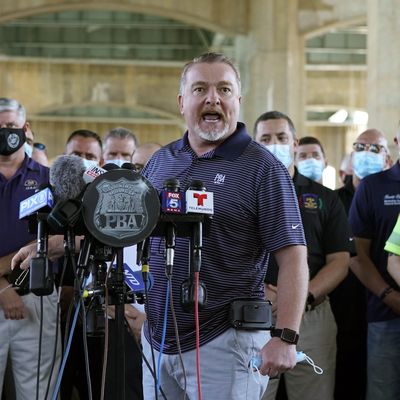
In 2011, Wisconsin Republicans led by Governor Scott Walker enacted a controversial measure to weaken the state’s public employee unions. But they exempted firefighters and police officers, reflecting the conservative movement view that unions may be bad, but cops are very good.
But in the wake of the George Floyd murder, the conservative movement view is changing. The Wall Street Journal editorial page, National Review, the Washington Examiner, Heritage Foundation, and even the Federalist have all identified police unions as a primary culprit in allowing violent and racist officers to operate with impunity. Even Walker, normally an authoritarian apparatchik, now concedes that he was wrong to exempt police.
Curtailing police unions may not be a sufficient response to the scale of the problem — as Eric Levitz pointed out, the handful of states without unionized police forces have hardly banished police misconduct — but it does seem to be a necessary step. Reporters like Noam Scheiber and Melissa Segura have detailed how police unions have thwarted even fairly determined efforts to curtail biased and abusive policing. One study found that police agencies that unionized saw a 27 percent increase in misconduct complaints, as officers wielded their newfound impunity.
The common theme running through these accounts is that unions bargain not only for better pay and benefits, but also job security that shields their members from accountability. Any effort to reform police means changing the rules governing the conduct, but the enforcement of those rules requires subjecting officers to accountability and, ultimately, the loss of their job if they refuse to cooperate.
Of course, making it hard to fire people is one of the central functions of most unions. In the case of police officers, this protection effectively insulates the most violent, bigoted and authoritarian cops from complying with regulations. The union is the trapdoor beneath every police reform campaign.
The Washington Post has two related accounts of how police routinely thwart reform. The first is an analysis of a new paper in Yale Law Journal about fired police officers. They often get hired elsewhere, usually in smaller towns that have fewer resources — and which are either unaware of, or indifferent to, their offenses. They estimate that 3 percent of all police officers in Florida have previously been fired from other jobs as police officers.
That finding is even more harrowing when read in conjunction with a second piece in the Post, by Daniel Oats, a former police chief. Oats describes the difficulty police unions pose to an agency that is trying to weed out bad actors. Any cop subject to discipline usually has the benefit of an arbitration process stacked in their favor, enabling (among other advantages) a full review of all evidence marshaled against them before they have to testify, so they can craft their testimony to avoid being caught in a lie. Oats writes that during a nine-year stint as police chief in Aurora, Colorado, he wanted to fire 16 (out of 650) cops. He only succeeded in firing four of them — and three of those firings were reversed by the Civil Service Commission.
The grueling, lengthy, low-probability process of trying to remove an officer has the predictable effect of discouraging police chiefs from even trying to fire miscreants. The drain of time and resources is simply not worth it, he argues, except with the worst of the worst.
When you consider this in conjunction with the fact that many fired officers just get new police jobs elsewhere, you have a picture of how overmatched any reformer is against the protections most officers enjoy. Again, the precise details differ significantly from town to town, and some police forces have humane cultures and more robust systems of accountability.
The problem of police unions upends the normal ideological divisions. The left loves unions and dislikes police, and the right loves police and hates unions. At the moment, the left has largely overlooked its affinity for labor, and the right has overlooked its support for police, perhaps because Floyd’s grisly murder and the scenes of brutality against protesters have put the rot in police department cultures across the country on such vivid display.
Perhaps polarization will swallow up the fleeting moment of consensus. (President Trump himself has expressed no interest in taking on the police unions, whose abuses he has enabled and goaded on.) But maybe there is an opportunity here to strike a blow against the impunity that has permitted this pervasive culture of police racism and abuse.






























